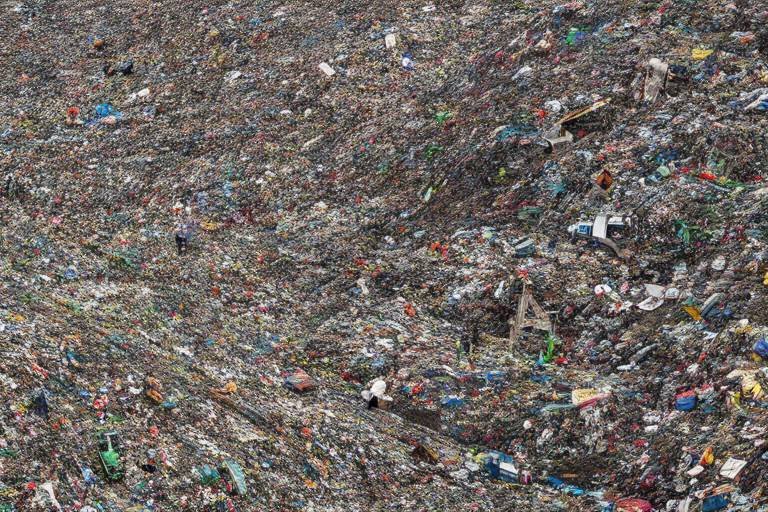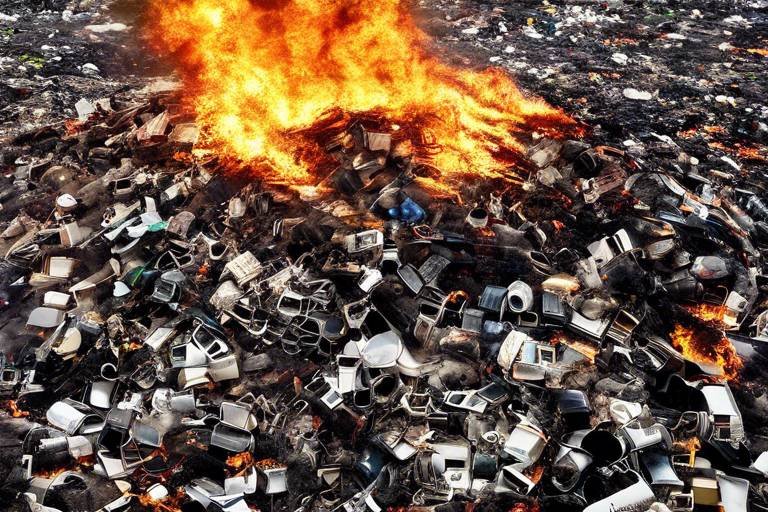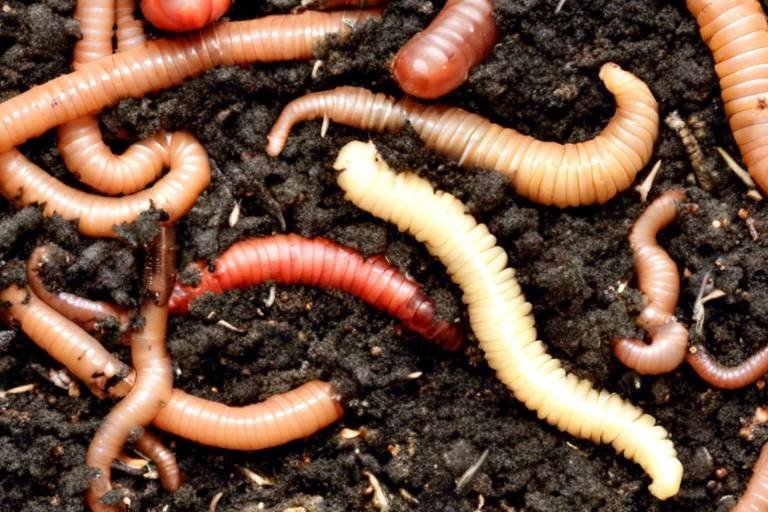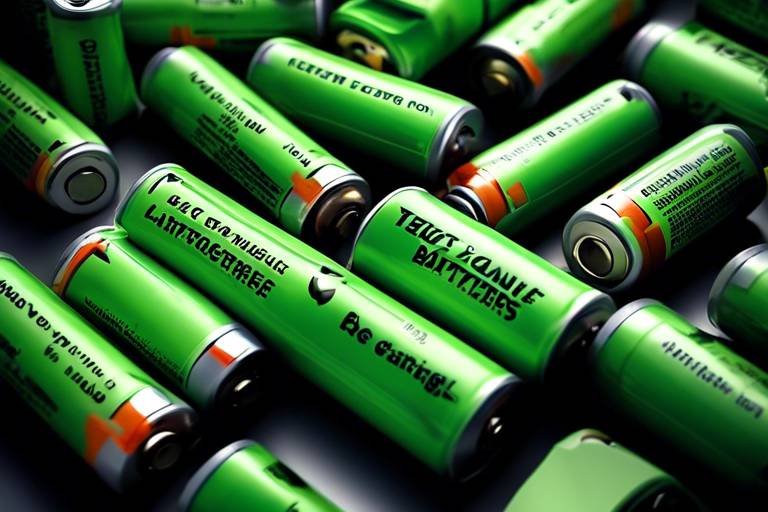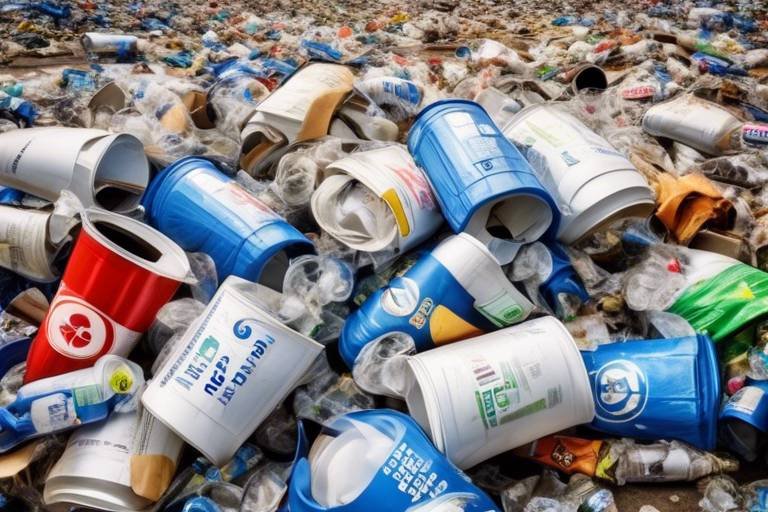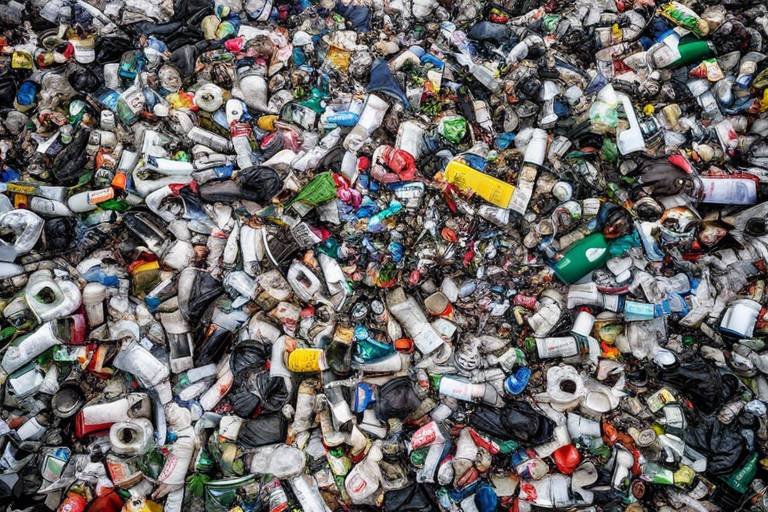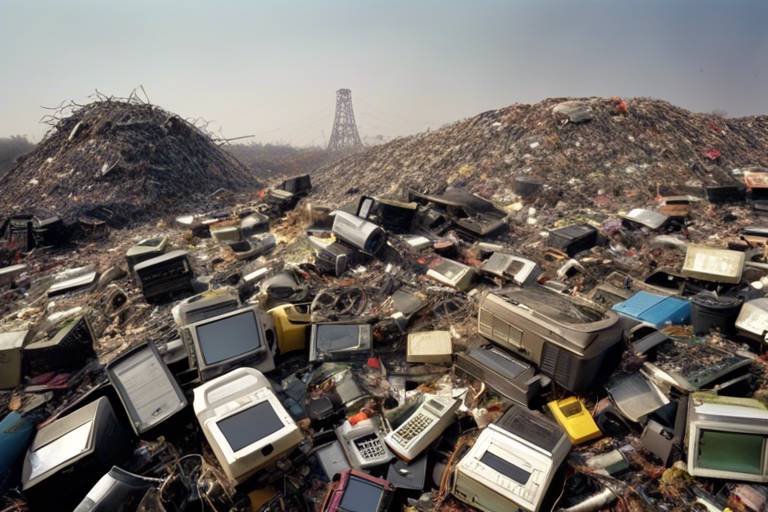The Role of Insect Farming in Organic Recycling
In recent years, the world has become increasingly aware of the pressing need for sustainable practices, particularly in waste management and food production. One of the most exciting developments in this arena is insect farming, which has emerged as a powerful ally in the quest for organic recycling. But what exactly does insect farming entail, and how does it contribute to a greener planet? This article delves into the fascinating world of insect farming, examining its benefits, processes, and potential impacts on sustainability and waste management.
At its core, insect farming is the practice of raising insects for various purposes, including waste reduction and protein production. Insects, such as black soldier flies and mealworms, are not only nutritious but also incredibly efficient at converting organic waste into valuable resources. By utilizing insects in organic recycling, we can tackle the growing problem of food waste and transform it into high-quality protein for animal feed or even human consumption. Imagine turning your kitchen scraps into a sustainable source of nutrition—this is the promise of insect farming!
The benefits of insect farming extend far beyond simple waste conversion. One of the most remarkable advantages is its ability to significantly reduce greenhouse gas emissions. Traditional livestock farming is notorious for its environmental impact, contributing to deforestation, methane emissions, and water pollution. In contrast, insect farming requires far less land, water, and feed, making it a much more sustainable option. Let's explore some key benefits:
- Efficient Waste Conversion: Insects can consume a wide range of organic materials, including food scraps, agricultural by-products, and even manure, transforming them into valuable biomass.
- Low Resource Requirements: Insect farming requires significantly less space and water compared to traditional livestock farming, making it an ideal solution for urban areas.
- High Nutritional Value: Insects are a rich source of protein, vitamins, and minerals, making them an excellent alternative to conventional protein sources.
One of the most compelling aspects of insect farming is its role in waste management. With the global food waste crisis escalating, finding effective solutions has never been more crucial. Insects can effectively break down organic waste, providing a sustainable solution that not only reduces landfill burden but also enhances recycling efforts. For instance, the larvae of black soldier flies can consume up to 25% of their body weight in food waste daily, converting it into protein-rich biomass. This rapid decomposition process not only diverts waste from landfills but also generates high-quality organic fertilizer as a by-product.
Insects are incredibly versatile and can process a variety of organic waste materials, including:
- Food Scraps: Leftover fruits, vegetables, and other food items are ideal for insect farming.
- Agricultural Residues: Crop leftovers and by-products can be effectively utilized to feed insects.
- Food Industry Waste: Waste generated from food processing plants can be converted into insect biomass.
Insects are known for their rapid growth and high feed conversion rates, making them ideal for efficient waste recycling. For example, black soldier fly larvae can grow from egg to pupae in just 14 days, achieving a feed conversion efficiency of up to 2:1. This means that for every 2 kilograms of organic waste fed to them, they can produce 1 kilogram of insect biomass. This incredible efficiency not only maximizes the use of available resources but also minimizes the environmental footprint associated with waste disposal.
Beyond environmental benefits, insect farming can create new economic opportunities and jobs in the recycling sector. As the demand for sustainable protein sources rises, insect farming presents a unique opportunity for entrepreneurs and farmers alike. By integrating insect farming into existing agricultural practices, we can foster innovation and sustainability, ultimately leading to economic growth and job creation.
Despite its numerous advantages, insect farming is not without its challenges. Regulatory hurdles and public perception remain significant obstacles that need to be addressed for broader adoption. Understanding these challenges is crucial for paving the way toward a sustainable future.
The regulatory environment for insect farming varies by region, with some areas embracing the practice while others lag behind. A supportive regulatory framework is essential to promote sustainable practices and ensure food safety. As the industry evolves, collaboration between governments, researchers, and farmers will be vital in establishing guidelines that facilitate the growth of insect farming.
Public perception of insects as a food source remains a barrier to widespread acceptance. Many people are still hesitant to embrace insects in their diets, viewing them as pests rather than a valuable protein source. To overcome this hurdle, educational campaigns and marketing strategies are needed to raise awareness about the benefits of insect farming and its role in organic recycling.
The future of insect farming in organic recycling looks promising as technology and practices evolve. Innovations in farming techniques, waste processing, and product development are set to shape its role in sustainability. As we continue to explore the potential of insect farming, we may find ourselves at the forefront of a new agricultural revolution that not only addresses waste management but also contributes to global food security.
1. What types of insects are commonly farmed for organic recycling?
Black soldier flies and mealworms are among the most commonly farmed insects due to their efficiency in waste conversion.
2. How does insect farming help reduce greenhouse gas emissions?
Insect farming requires significantly less land, water, and feed compared to traditional livestock farming, resulting in lower emissions.
3. Can insects be a viable food source for humans?
Yes! Insects are highly nutritious and can be consumed directly or used in food products like protein bars and flour.

Understanding Insect Farming
Insect farming is an innovative and increasingly popular practice that revolves around the cultivation of insects for a variety of purposes, including waste reduction and protein production. Imagine a world where organic waste is not just discarded but transformed into valuable resources. That's precisely what insect farming aims to achieve! By harnessing the natural biological processes of insects, we can address some of the most pressing challenges in waste management and sustainability.
At its core, insect farming entails raising specific species of insects under controlled conditions. These insects are not only efficient at breaking down organic matter but also serve as a sustainable source of protein for both humans and livestock. This dual functionality makes insect farming a key player in the realm of organic recycling. Insects such as black soldier flies, mealworms, and crickets are commonly farmed due to their remarkable ability to convert organic waste into high-quality protein and other valuable by-products.
One of the most fascinating aspects of insect farming is its relevance to organic recycling. When we talk about recycling, we often think of materials like plastic, paper, and glass. However, organic waste—such as food scraps and agricultural residues—constitutes a significant portion of the waste generated globally. Insect farming provides a unique solution to this problem by efficiently converting organic waste into nutritious insect biomass, which can then be used in animal feed, fertilizers, and even human food products.
Insect farming operates on a simple yet effective principle: nature's recyclers. Insects possess a natural ability to consume and break down organic materials, transforming them into something entirely new. This process not only reduces the volume of waste sent to landfills but also minimizes greenhouse gas emissions associated with traditional waste disposal methods. Furthermore, the rapid growth rates and high feed conversion efficiency of insects make them an ideal candidate for sustainable waste management.
To provide a clearer picture, let's consider a few key factors that highlight the significance of insect farming in organic recycling:
| Factor | Description |
|---|---|
| Waste Reduction | Insects can consume large quantities of organic waste, significantly reducing landfill contributions. |
| High Nutritional Value | Insect protein is rich in essential amino acids, making it a valuable food source. |
| Low Environmental Impact | Insect farming requires less land and water compared to traditional livestock farming. |
As we delve deeper into the world of insect farming, it becomes evident that this practice is not merely a trend but a transformative approach to waste management and protein production. By understanding the fundamental principles of insect farming, we can appreciate its potential to revolutionize how we think about organic waste and sustainability.

Benefits of Insect Farming
Insect farming is rapidly gaining recognition as a viable solution for tackling some of the world's most pressing environmental issues. One of the most significant benefits of insect farming is its ability to efficiently convert organic waste into valuable resources. Imagine a world where food scraps and agricultural byproducts are transformed into high-quality protein and organic fertilizer. This is not just a dream; it's a reality made possible through the innovative processes of insect farming.
Insects, such as black soldier flies and mealworms, are nature's own recyclers. They thrive on organic waste, breaking it down and converting it into biomass at an astonishing rate. For instance, black soldier fly larvae can consume up to 25% of their body weight in food waste daily, making them incredibly efficient in waste conversion. This efficiency not only reduces the volume of waste sent to landfills but also minimizes the greenhouse gas emissions associated with waste decomposition.
Furthermore, insect farming is a sustainable alternative to traditional livestock farming. The environmental footprint of raising insects is significantly lower than that of cattle or pigs. Insects require less land, water, and feed to produce the same amount of protein. To put it into perspective, producing one kilogram of protein from crickets requires only about 1,700 liters of water, compared to the staggering 15,500 liters needed for beef production. This stark difference highlights how insect farming can contribute to sustainable food systems and help combat water scarcity.
In addition to environmental benefits, insect farming also presents substantial economic opportunities. As the demand for sustainable protein sources grows, so does the potential for job creation in the insect farming sector. From farming operations to processing facilities and distribution networks, a whole new industry is emerging. This not only helps boost local economies but also provides a range of employment options, from technical roles to agricultural management.
Moreover, insect farming can play a crucial role in supporting circular economy principles. By integrating insect farming into existing waste management systems, communities can create a closed-loop system where waste is continuously recycled. This not only reduces the need for virgin resources but also promotes sustainability and resilience in local economies.
In summary, the benefits of insect farming extend far beyond just waste management. It offers a holistic approach to sustainability, addressing environmental, economic, and social challenges. As we move towards a more sustainable future, the role of insect farming in organic recycling will undoubtedly become increasingly important.
- What types of insects are commonly farmed for organic recycling? The most commonly farmed insects include black soldier flies, mealworms, and crickets.
- How do insects help in waste management? Insects can consume large quantities of organic waste and convert it into protein and fertilizer, reducing landfill waste.
- Is insect farming environmentally friendly? Yes, insect farming has a much lower environmental impact compared to traditional livestock farming, requiring less land, water, and feed.
- Can insect farming create jobs? Absolutely! The growing insect farming industry has the potential to create numerous job opportunities in various sectors.

Waste Management Solutions
When it comes to tackling the ever-growing issue of organic waste, insect farming emerges as a beacon of hope, offering innovative solutions that are both effective and sustainable. Insects, particularly larvae of certain species like the black soldier fly, have an incredible ability to consume organic waste, transforming it into valuable biomass. This process not only reduces the volume of waste that ends up in landfills but also converts it into high-protein feed for livestock, thereby closing the loop in the food production chain.
Imagine a world where food scraps, agricultural residues, and other organic materials are not merely discarded but instead transformed into resources. This is where insect farming shines. By harnessing the natural decomposition abilities of insects, we can significantly alleviate the burden on traditional waste management systems. Insects can consume a wide range of organic waste, including:
- Food scraps from households and restaurants
- Agricultural by-products, such as crop residues
- Animal manure, which is often a challenge to manage
These waste materials, which would typically require extensive processing and disposal methods, can be efficiently processed by insects within a matter of days. This rapid conversion not only enhances the efficiency of waste management practices but also minimizes greenhouse gas emissions that would otherwise result from organic waste decomposition in landfills. In fact, studies have shown that using insects in waste management can reduce emissions by up to 80%, making it a highly attractive option for cities and communities striving for sustainability.
Moreover, the waste management solutions provided by insect farming do not stop at waste reduction. The end products of this process are rich in nutrients and can be used as organic fertilizers or high-quality animal feed. This dual benefit not only helps in recycling organic waste but also contributes to sustainable agriculture. By integrating insect farming into existing waste management systems, we can create a circular economy that not only reduces waste but also promotes resource efficiency.
As we look towards the future, the role of insect farming in waste management is likely to expand. Innovations in farming techniques and processing methods will enhance the scalability of these solutions, making them accessible to more communities worldwide. The potential for insects to play a pivotal role in organic recycling is immense, and as we continue to explore these possibilities, we may find ourselves on a path to a more sustainable and waste-free future.

Types of Organic Waste Processed
When we think about organic waste, what typically comes to mind? Most people envision food scraps and garden clippings, but the reality is far richer and more diverse. Insect farming is capable of processing a wide variety of organic materials, making it a versatile solution in the realm of organic recycling. This farming method not only helps in reducing waste but also transforms it into valuable resources, such as animal feed and organic fertilizers.
One of the most common types of organic waste processed by insects includes food scraps. These can range from leftover fruits and vegetables to expired dairy products. Interestingly, insects such as black soldier flies thrive on these food remnants, converting them into protein-rich biomass. This not only diverts waste from landfills but also provides a sustainable source of nutrients for livestock.
In addition to food scraps, insect farming can effectively process agricultural residues. This includes by-products from crop production, such as stems, leaves, and other plant parts that are typically discarded. Instead of allowing these materials to decompose and release greenhouse gases, insects can break them down quickly and efficiently. By doing so, they help to close the loop in agricultural waste management.
Moreover, insects can also utilize manure from livestock as a nutrient source. This is particularly significant in regions where livestock farming is prevalent, as it provides a means to recycle waste that would otherwise contribute to environmental pollution. The larvae of certain insects can consume manure, thus reducing its volume and converting it into usable protein.
To give you a clearer picture, here is a brief overview of the types of organic waste that insects can process:
| Type of Organic Waste | Description |
|---|---|
| Food Scraps | Leftover fruits, vegetables, and expired food products. |
| Agricultural Residues | By-products from crop production, such as stems and leaves. |
| Livestock Manure | Waste from farm animals, which can be converted into protein. |
| Food Processing Waste | By-products from food manufacturing processes. |
In summary, the types of organic waste processed by insects are not limited to just food scraps. They encompass a broader spectrum, including agricultural residues and livestock manure. By harnessing the power of insects, we can not only tackle waste management challenges but also promote sustainability in our food systems. As we continue to innovate and expand our understanding of insect farming, the potential for processing various types of organic waste will only grow, leading to a more sustainable future.
- What types of insects are commonly used in farming? Black soldier flies and mealworms are among the most popular insects used for waste processing.
- Can insects process all types of organic waste? While insects are versatile, they are most effective with food scraps, agricultural residues, and manure.
- What are the benefits of using insects for organic waste recycling? Insects convert waste into valuable protein and fertilizers, reduce landfill use, and lower greenhouse gas emissions.
- Is insect farming environmentally friendly? Yes, insect farming is considered environmentally friendly as it promotes waste reduction and resource efficiency.

Efficiency of Waste Conversion
When it comes to the efficiency of waste conversion, insects are like nature's little recyclers, working tirelessly to turn organic waste into valuable resources. These tiny powerhouses can convert organic materials into protein-rich biomass at astonishing rates. For instance, the black soldier fly (Hermetia illucens) is particularly renowned for its ability to process organic waste rapidly. In optimal conditions, these larvae can grow from egg to pupae in just a matter of weeks, demonstrating a remarkable feed conversion efficiency that can exceed 10:1. This means that for every 10 kilograms of organic waste, you can potentially produce 1 kilogram of insect protein!
What makes insects such efficient waste converters? One reason is their unique digestive system, which allows them to break down complex organic materials that would typically be challenging for traditional composting methods. They thrive on a variety of organic waste types, including food scraps, agricultural residues, and even manure. By consuming these materials, insects not only reduce waste volume but also mitigate the greenhouse gas emissions associated with decomposition in landfills.
To illustrate the efficiency of waste conversion by insects, consider the following comparison:
| Type of Organic Waste | Waste Reduction Efficiency | Protein Yield (kg) |
|---|---|---|
| Food Scraps | Up to 90% | 1 kg from 10 kg waste |
| Agricultural Residues | 70-80% | 1 kg from 12 kg waste |
| Manure | 60-70% | 1 kg from 15 kg waste |
This table highlights the impressive waste reduction efficiencies achieved by insects, showcasing their potential to transform various types of organic waste into valuable protein sources. Additionally, the byproducts of insect farming, such as frass (insect manure), can be used as a nutrient-rich fertilizer, further enhancing the sustainability of agricultural practices.
Moreover, the rapid life cycle and high reproductive rates of insects mean that they can produce multiple generations in a short time frame. This exponential growth not only maximizes waste conversion but also contributes to a more sustainable food system by providing a consistent and reliable source of protein. As we face the growing challenges of waste management and food security, the role of insects in waste conversion becomes increasingly vital.
- What types of waste can insects process? Insects can process a wide range of organic materials, including food scraps, agricultural residues, and manure.
- How fast do insects grow? Some insects, like black soldier fly larvae, can grow from egg to pupae in just a few weeks under optimal conditions.
- What are the benefits of using insects for waste conversion? Insects provide efficient waste reduction, reduce greenhouse gas emissions, and produce valuable protein and fertilizer.
- Is insect farming sustainable? Yes, insect farming is considered a sustainable practice as it helps recycle waste and reduces the environmental impact of traditional livestock farming.

Economic Impact of Insect Farming
Insect farming is not just an innovative solution for waste management; it also holds the potential to significantly transform economies across the globe. Imagine a world where organic waste is not just discarded but instead turned into a thriving industry. Insect farming does exactly that by creating a new market for both waste reduction and protein production. As we delve into the economic implications of this burgeoning field, it's essential to recognize how it can generate new job opportunities and stimulate local economies.
One of the most exciting aspects of insect farming is its ability to create jobs in various sectors. From farming and processing to distribution and retail, the entire supply chain can benefit from this innovative approach. For instance, a small-scale insect farm can employ local workers, contributing to the community's economic stability. Furthermore, as demand for insect-based products increases, we may see the emergence of new businesses focused on insect feed, processing technologies, and even insect-based food products. This multiplier effect can lead to a more robust economy, particularly in rural areas where traditional agricultural jobs may be declining.
Moreover, insect farming can contribute to a more sustainable agricultural system. By converting organic waste into high-quality protein, insect farming reduces the reliance on conventional livestock farming, which is often resource-intensive and environmentally damaging. The reduced need for animal feed can lead to lower production costs, making it an attractive alternative for farmers. In fact, studies have shown that insects can convert feed into protein more efficiently than traditional livestock. For example, it takes approximately 1.7 kg of feed to produce 1 kg of cricket protein, compared to 8 kg for beef. This efficiency not only benefits farmers economically but also contributes to overall food security.
As we consider the broader economic impact, it's important to highlight how insect farming can also play a role in reducing waste disposal costs. Municipalities spend significant amounts on waste management, and incorporating insect farming into their waste disposal strategies could alleviate some of these costs. By diverting organic waste to insect farms, cities can reduce landfill use and lower their waste management expenses, creating a win-win situation for both the environment and local budgets.
However, to fully realize the economic potential of insect farming, significant investment in research and development is necessary. This includes exploring breeding techniques, optimizing feed conversion rates, and developing processing technologies. As the industry grows, we can expect to see increased funding from both private and public sectors, which will further enhance economic opportunities and innovations within the field.
In conclusion, the economic impact of insect farming extends far beyond mere job creation. It has the potential to revolutionize waste management, contribute to food security, and foster sustainable agricultural practices. As we move forward, embracing this innovative approach could lead to a more resilient and sustainable economy, making insect farming a vital player in the future of both agriculture and waste management.
- What types of insects are commonly farmed?
Commonly farmed insects include crickets, mealworms, and black soldier flies, all of which have proven to be efficient in waste conversion and protein production.
- How does insect farming contribute to sustainability?
Insect farming reduces organic waste, lowers greenhouse gas emissions, and provides a sustainable protein source, making it an eco-friendly alternative to traditional livestock farming.
- What are some challenges facing the insect farming industry?
Challenges include regulatory hurdles, public perception issues, and the need for further research and development to optimize farming practices.

Challenges in Insect Farming
While insect farming presents a multitude of benefits, it is not without its challenges. One of the most significant hurdles is the regulatory framework surrounding insect farming, which can vary dramatically from one region to another. In some areas, the regulations are stringent and complex, making it difficult for new farmers to enter the market. This inconsistency can stifle innovation and slow down the adoption of insect farming as a mainstream solution for organic recycling. For instance, in the European Union, the regulations regarding the use of insects in animal feed are particularly strict, which can deter potential investors and farmers.
Another major challenge is public awareness and acceptance. Despite the nutritional benefits and sustainability advantages of insects, many people still view them with skepticism. The idea of consuming insects or using them in food production can be off-putting for some, leading to a significant gap between the potential benefits of insect farming and public perception. To combat this, educational campaigns are crucial. These campaigns should aim to inform the public about the environmental benefits of insect farming, such as its role in reducing waste and greenhouse gas emissions. By highlighting the nutritional value and ecological advantages, we can shift public perception and increase acceptance.
Moreover, there are economic barriers that need to be addressed. While insect farming can create jobs and stimulate local economies, the initial setup costs can be high. Farmers may need to invest in specialized equipment or facilities to raise insects effectively. This financial barrier can deter small-scale farmers from entering the industry, which is a shame because small farms often play a crucial role in sustainable practices. Additionally, the market for insect-based products is still developing, which can lead to uncertainty for new entrants. However, as demand for sustainable protein sources grows, this challenge may gradually diminish.
Finally, the technical knowledge required for successful insect farming can be a barrier to entry. Insects have specific needs regarding temperature, humidity, and diet, and understanding these requirements is essential for maximizing production. Without proper training and resources, new farmers may struggle to achieve optimal results, leading to wasted resources and potential financial losses. Educational programs and workshops can be instrumental in equipping aspiring insect farmers with the knowledge they need to succeed.
In summary, while the path to widespread insect farming adoption is fraught with challenges, addressing these obstacles through education, regulatory reform, and financial support can pave the way for a more sustainable future. The potential benefits of insect farming in organic recycling are too significant to ignore, and with the right strategies in place, we can overcome these challenges together.
- What are the main benefits of insect farming? Insect farming offers efficient waste conversion, reduced greenhouse gas emissions, and a sustainable source of protein.
- How do insects help in waste management? Insects can effectively break down organic waste, transforming it into valuable products like compost or animal feed.
- What are the challenges faced by insect farmers? Challenges include regulatory hurdles, public perception, economic barriers, and the need for technical knowledge.
- How can public acceptance of insect farming be improved? Through educational campaigns that highlight the environmental and nutritional benefits of insects.

Regulatory Frameworks
Insect farming is an innovative approach to waste management and protein production, but its growth is significantly influenced by the in place. These frameworks can vary widely from one region to another, creating a patchwork of regulations that can either support or hinder the development of insect farming practices. Understanding these regulations is crucial for anyone looking to enter the field or invest in insect farming as a sustainable solution for organic recycling.
In many countries, regulations regarding insect farming are still in their infancy. This can lead to confusion and uncertainty among potential farmers and investors. For instance, in the European Union, the regulations surrounding insect farming are governed by the EU Feed Regulation and the Novel Food Regulation. These regulations stipulate how insects can be raised, processed, and marketed. Compliance with these regulations is essential not only for legal operation but also for ensuring the safety and quality of insect products.
On the other hand, some regions are more progressive, actively encouraging insect farming through supportive policies. For example, countries like Thailand and the Netherlands have established frameworks that promote research and development in insect farming. This support often includes funding for innovative projects, tax incentives for farmers, and partnerships with academic institutions to advance insect farming technologies.
To illustrate the differences in regulatory frameworks, consider the following table:
| Region | Key Regulations | Supportive Measures |
|---|---|---|
| European Union | EU Feed Regulation, Novel Food Regulation | Limited funding, strict compliance requirements |
| Thailand | Food Safety Standards | Government funding, R&D support |
| United States | FDA Regulations | Emerging support, state-level initiatives |
| Netherlands | Animal Feed Regulation | Tax incentives, research partnerships |
As the insect farming industry continues to grow, it is vital for stakeholders to advocate for clearer and more supportive regulations. This includes engaging with policymakers to highlight the environmental benefits of insect farming, such as its potential to reduce organic waste and lower greenhouse gas emissions. By fostering a collaborative relationship between farmers, researchers, and regulators, the insect farming sector can thrive, ultimately contributing to more sustainable waste management practices.
In conclusion, the regulatory landscape for insect farming is complex and varies significantly across different regions. As this industry evolves, it will be essential for all parties involved to remain informed and proactive in shaping regulations that facilitate the growth of insect farming as a key player in organic recycling.
- What are the main regulations governing insect farming? Regulations vary by region, but common frameworks include food safety standards and feed regulations.
- How can I get involved in insect farming? Research local regulations, seek out training programs, and connect with existing insect farms for guidance.
- What are the environmental benefits of insect farming? Insect farming can significantly reduce organic waste and lower greenhouse gas emissions compared to traditional livestock farming.

Public Awareness and Acceptance
When it comes to insect farming and its role in organic recycling, one of the biggest hurdles we face is public perception. Many people still view insects as pests rather than potential food sources or valuable recyclers. This outdated view can be likened to how our ancestors once feared the idea of eating sushi or drinking coffee. Over time, these foods became accepted and even celebrated in many cultures. Similarly, we need to shift our mindset about insects to recognize their benefits.
To foster this change, education plays a crucial role. Initiatives aimed at raising awareness about the environmental and economic benefits of insect farming can help demystify the practice. For instance, many consumers are unaware that insects are not only highly nutritious but also require significantly less land and water compared to traditional livestock. In fact, insects can convert organic waste into protein with remarkable efficiency, reducing our reliance on more resource-intensive food sources.
Moreover, the culinary world is beginning to embrace insects, with chefs incorporating them into gourmet dishes. This growing trend can help normalize the consumption of insects and present them as a viable alternative. Just like how quinoa and kale took the food scene by storm, insects could become the next big thing if marketed effectively.
Here are some strategies that can be employed to enhance public awareness and acceptance:
- Educational Campaigns: Launching campaigns that inform the public about the benefits of insects in our diets and their role in sustainable practices.
- Community Workshops: Hosting workshops where people can learn how to cook with insects, making them more approachable and less intimidating.
- Partnerships with Influencers: Collaborating with food bloggers and influencers to showcase delicious insect-based recipes can help change perceptions.
- Transparency in Farming Practices: Providing information about how insects are farmed and processed can build trust with consumers.
Additionally, governments and organizations can play a significant role in shaping public opinion. By supporting insect farming through regulatory frameworks and funding research, they can help pave the way for broader acceptance. As more people become aware of the pressing issues surrounding waste management and sustainability, the acceptance of insect farming is likely to grow.
In conclusion, while the road to public acceptance of insect farming may be long, it is not impossible. With concerted efforts in education, culinary innovation, and community engagement, we can shift perceptions and embrace insects as a valuable resource in our quest for sustainable living.
1. Are insects safe to eat?
Yes, insects are safe to eat when sourced from reputable farms that adhere to health and safety regulations. They are rich in protein and other nutrients.
2. What types of insects are commonly farmed?
Commonly farmed insects include crickets, mealworms, and black soldier flies, all of which are used in various food products and waste management solutions.
3. How does insect farming contribute to sustainability?
Insect farming reduces organic waste, requires fewer resources than traditional livestock, and emits lower greenhouse gases, making it a sustainable alternative.
4. Can insects be used in animal feed?
Absolutely! Insects are increasingly being used as a protein source in animal feed, providing a nutritious and sustainable option for livestock.

Future of Insect Farming in Recycling
The future of insect farming in organic recycling is not just a fleeting trend; it’s a burgeoning field that promises to revolutionize how we manage waste and produce food. As we become increasingly aware of the environmental challenges we face, the role of insects in recycling is becoming clearer. Imagine a world where organic waste is not just discarded but transformed into valuable resources. Insects, with their incredible ability to convert waste into protein-rich biomass, are at the forefront of this transformation.
One of the most exciting prospects is the integration of advanced technologies such as artificial intelligence and biotechnology in insect farming. These innovations will enhance the efficiency of insect rearing and waste processing, making it possible to scale operations significantly. For instance, AI can optimize feeding schedules and environmental conditions, ensuring that insects grow faster and healthier. This not only increases productivity but also reduces the environmental footprint of farming.
Moreover, as urbanization continues to rise, the potential for urban insect farms is immense. Picture rooftop farms in bustling cities where food waste is converted into high-protein feed for livestock or even human consumption. This not only addresses waste management in urban settings but also promotes local food production, reducing the need for transportation and its associated carbon emissions.
Another trend on the horizon is the increasing acceptance of insects as a sustainable food source. As more people become aware of the environmental benefits of insect consumption, we may see a significant shift in dietary habits. Educational campaigns and culinary innovations will play a crucial role in this transition. For example, chefs and food brands are already experimenting with insect-based products, from protein bars to gourmet dishes, which could normalize the idea of eating insects.
To further illustrate the potential of insect farming, consider the following table that outlines key innovations expected to shape the future of this industry:
| Innovation | Description | Impact |
|---|---|---|
| AI Integration | Using artificial intelligence to optimize insect farming processes. | Increased efficiency and reduced resource consumption. |
| Urban Farming | Establishing insect farms in urban areas to process local waste. | Improved waste management and local food production. |
| Consumer Acceptance | Raising awareness about the benefits of consuming insects. | Broader market for insect-based products. |
Finally, collaboration among industries, governments, and research institutions will be vital. By working together, we can develop supportive policies and funding opportunities that encourage the growth of insect farming. This collaboration will not only bolster the insect farming sector but also contribute to broader sustainability goals.
In conclusion, the future of insect farming in recycling is bright and full of potential. With the right innovations, public acceptance, and collaborative efforts, we can harness the power of insects to create a more sustainable and efficient waste management system. The question is not if insect farming will play a significant role in our future, but rather how quickly we can adapt and embrace this remarkable solution.
- What types of insects are commonly farmed for recycling? Common insects include black soldier flies, mealworms, and crickets, all of which are excellent at breaking down organic waste.
- How does insect farming benefit the environment? Insect farming reduces the volume of organic waste, lowers greenhouse gas emissions, and provides a sustainable source of protein.
- Can insects be used for human food? Yes, many insects are safe and nutritious for human consumption, and they are already being incorporated into various food products.
- What challenges does insect farming face? Challenges include regulatory hurdles, public perception, and the need for technological advancements.
Frequently Asked Questions
- What is insect farming?
Insect farming is the practice of raising insects for various purposes, including waste reduction and protein production. It plays a vital role in organic recycling by efficiently converting organic waste into valuable resources.
- How does insect farming contribute to organic recycling?
Insect farming contributes to organic recycling by breaking down organic waste, such as food scraps and agricultural residues. Insects can convert this waste into protein-rich feed and organic fertilizers, thus enhancing recycling efforts and reducing landfill waste.
- What types of organic waste can insects process?
Insects can process various types of organic waste, including food scraps, agricultural by-products, and even certain types of industrial waste. This versatility makes them an effective solution for managing different waste streams.
- What are the environmental benefits of insect farming?
Insect farming offers significant environmental benefits, such as reducing greenhouse gas emissions, lowering waste management costs, and promoting sustainable agricultural practices. By recycling organic waste, insects help mitigate the environmental impact of traditional waste disposal methods.
- Are there economic opportunities in insect farming?
Yes, insect farming can create new economic opportunities and jobs in the recycling sector. As demand for sustainable protein sources grows, insect farming presents a viable business model that can contribute to local economies and job creation.
- What challenges does insect farming face?
Insect farming faces several challenges, including regulatory hurdles and public perception issues. Many regions lack supportive regulatory frameworks, and there is often a stigma associated with using insects as a food source, which can hinder broader adoption.
- How can public awareness of insect farming be improved?
Improving public awareness of insect farming can be achieved through educational campaigns, cooking demonstrations, and partnerships with chefs and food influencers. By highlighting the benefits and safety of insect consumption, we can help shift public perception.
- What does the future hold for insect farming in recycling?
The future of insect farming in organic recycling looks promising, with ongoing advancements in technology and farming practices. Innovations in breeding, feed efficiency, and waste processing will likely enhance the role of insects in sustainable waste management.



